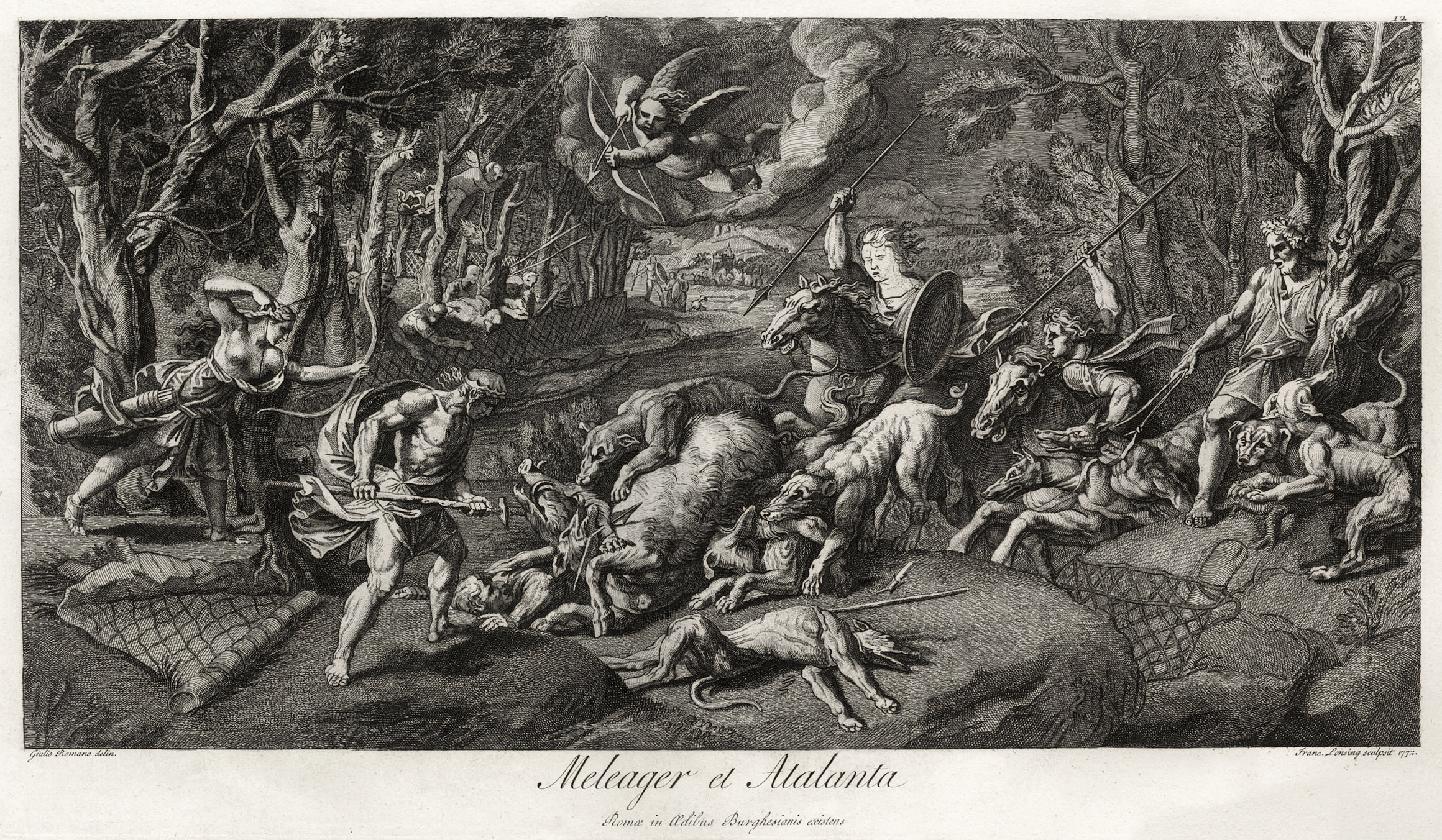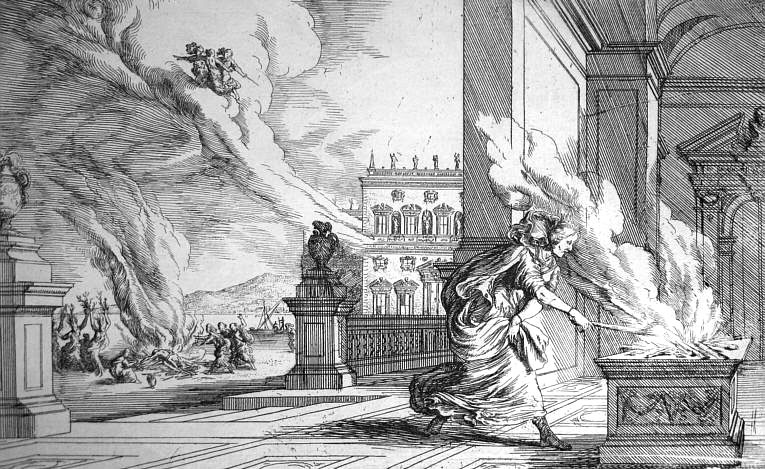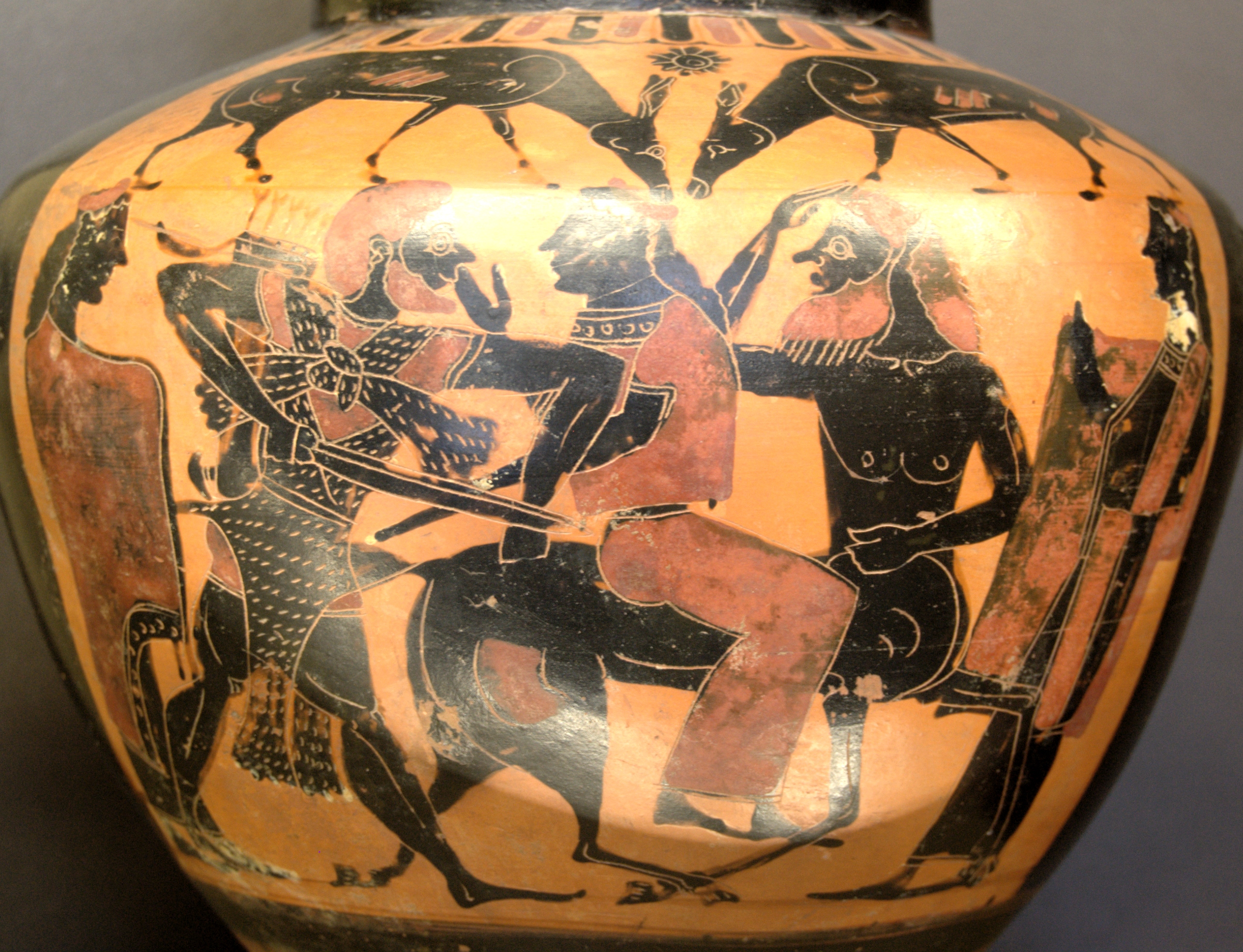|
Meleager
In Greek mythology, Meleager (, grc-gre, Μελέαγρος, Meléagros) was a hero venerated in his ''temenos'' at Calydon in Aetolia. He was already famed as the host of the Calydonian boar hunt in the epic tradition that was reworked by Homer. Meleager is also mentioned as one of the Argonauts. Biography Meleager was a Calydonian prince as the son of Althaea and the vintner King OeneusAntoninus Liberalis2as cited in Nicander's ''Metamorphoses'' or according to some, of the god Ares. He was the brother of Deianeira, Toxeus, Clymenus, Periphas, Agelaus (or Ageleus), Thyreus (or Phereus or Pheres), Gorge, Eurymede and Melanippe. Meleager was the father of Parthenopeus by Atalanta but he married Cleopatra, daughter of Idas and Marpessa. They had a daughter, Polydora, who became the bride of Protesilaus, who left her bed on their wedding-night to join the expedition to Troy. Mythology Calydonian boar hunt When Meleager was born, the Moirai (the Fates) predi ... [...More Info...] [...Related Items...] OR: [Wikipedia] [Google] [Baidu] |
Atalanta
Atalanta (; grc-gre, Ἀταλάντη, Atalantē) meaning "equal in weight", is a heroine in Greek mythology. There are two versions of the huntress Atalanta: one from Arcadia, whose parents were Iasus and Clymene and who is primarily known from the tales of the Calydonian boar hunt and the Argonauts; and the other from Boeotia, who is the daughter of King Schoeneus and is primarily noted for her skill in the footrace. In both versions, Atalanta was a local figure allied to the goddess Artemis; in such oral traditions, minor characters were often assigned different names, resulting in minor regional variations. Mythology Early life At birth, Atalanta was taken to Mount Parthenion to be exposed because her father had desired a son. A she-bear—one of the symbols of Artemis—whose cubs had been recently killed by hunters came upon Atalanta and nursed her until those same hunters discovered her and raised her themselves in the mountains. Atalanta then grew up to be a swif ... [...More Info...] [...Related Items...] OR: [Wikipedia] [Google] [Baidu] |
Calydonian Boar
The Calydonian boar hunt is one of the great heroic adventures in Greek legend. It occurred in the generation prior to that of the Trojan War, and stands alongside the other great heroic adventure of that generation, the voyage of the Argonauts, which preceded it. The purpose of the hunt was to kill the Calydonian boar (also called the Aetolian boar), which had been sent by Artemis to ravage the region of Calydon in Aetolia, because its king Oeneus had failed to honour her in his rites to the gods. The hunters, led by the hero Meleager, included many of the foremost heroes of Greece. In most accounts, it also included a great heroine, Atalanta, who won its hide by first wounding it with an arrow. This outraged some of the men, leading to a tragic dispute. Importance in Greek mythology and art Since the Calydonian boar hunt drew together numerous heroes—among whom were many who were venerated as progenitors of their local ruling houses among tribal groups of Hellenes into Cla ... [...More Info...] [...Related Items...] OR: [Wikipedia] [Google] [Baidu] |
Oineus
In Greek mythology, Oeneus (; grc , Οἰνεύς , Oineús , Wine-man) was a Calydonian king. He introduced wine-making to Aetolia, which he learned from Dionysus and the first who received a vine-plant from the same god.Apollodorus1.8.1/ref> Family Oeneus was the son of King Porthaon and Euryte, and thus, brother of Agrius, Alcathous, Melas, Leucopeus, and Sterope. He married Althaea and became the father of Deianeira, Meleager, Toxeus, Clymenus, Periphas, Agelaus (or Ageleus), Thyreus (or Phereus or Pheres), Gorge, Eurymede, Melanippe and Perimede (although Meleager's and Deianeira's fathers could also have been Ares and DionysusHyginus, ''Fabulae'' 129 respectively). s''ee Meleagrids''. Oeneus was also the father of Tydeus and possibly Melanippus or Olenias by Periboea, daughter of Hipponous, though Tydeus was exiled from Aetolia and appears in myths concerning Argos. According to Pausanias, Mothone was a daughter of Oeneus by a concubine. In some accounts, Polyxo was ... [...More Info...] [...Related Items...] OR: [Wikipedia] [Google] [Baidu] |
Althaea (mythology)
Althaea or Althea (; Ancient Greek: Ἀλθαία ''Althaía'' "healer" from ἀλθαίνω ''althaino'', "to cure", also "a kind of mallow") was the queen of Calydon in Greek mythology. Family Althaea was the daughter of King ThestiusAntoninus Liberalis2as cited in Nicander's ''Metamorphoses'' and Eurythemis, and was sister to Leda, Hypermnestra, Iphiclus, Euippus. She was also the wife of Oeneus, king of Calydon, and mother of sons, Meleager, Toxeus, Thyreus (Pheres or Phereus), Clymenus, Agelaus ( Ageleus), Periphas and daughters, Deianeira, Gorge, Melanippe and Eurymede (the latter two were included in the Meleagrids). According to some writers, Meleager was the result of a liaison with the Greek god Ares, and Deianeira the progeny of Althaea and the god Dionysus. In some accounts, Ancaeus was called her son by the god Poseidon. Mythology Althaea is especially remembered in ancient story about the fate of her son Meleager; they became the cause of each other ... [...More Info...] [...Related Items...] OR: [Wikipedia] [Google] [Baidu] |
Oeneus
In Greek mythology, Oeneus (; grc , Οἰνεύς , Oineús , Wine-man) was a Calydonian king. He introduced wine-making to Aetolia, which he learned from Dionysus and the first who received a vine-plant from the same god.Apollodorus1.8.1/ref> Family Oeneus was the son of King Porthaon and Euryte, and thus, brother of Agrius, Alcathous, Melas, Leucopeus, and Sterope. He married Althaea and became the father of Deianeira, Meleager, Toxeus, Clymenus, Periphas, Agelaus (or Ageleus), Thyreus (or Phereus or Pheres), Gorge, Eurymede, Melanippe and Perimede (although Meleager's and Deianeira's fathers could also have been Ares and DionysusHyginus, ''Fabulae'' 129 respectively). s''ee Meleagrids''. Oeneus was also the father of Tydeus and possibly Melanippus or Olenias by Periboea, daughter of Hipponous, though Tydeus was exiled from Aetolia and appears in myths concerning Argos. According to Pausanias, Mothone was a daughter of Oeneus by a concubine. In some accounts, Po ... [...More Info...] [...Related Items...] OR: [Wikipedia] [Google] [Baidu] |
Althaea (Greek Mythology)
Althaea or Althea (; Ancient Greek: Ἀλθαία ''Althaía'' "healer" from ἀλθαίνω ''althaino'', "to cure", also "a kind of mallow") was the queen of Calydon in Greek mythology. Family Althaea was the daughter of King ThestiusAntoninus Liberalis2as cited in Nicander's ''Metamorphoses'' and Eurythemis, and was sister to Leda, Hypermnestra, Iphiclus, Euippus. She was also the wife of Oeneus, king of Calydon, and mother of sons, Meleager, Toxeus, Thyreus (Pheres or Phereus), Clymenus, Agelaus ( Ageleus), Periphas and daughters, Deianeira, Gorge, Melanippe and Eurymede (the latter two were included in the Meleagrids). According to some writers, Meleager was the result of a liaison with the Greek god Ares, and Deianeira the progeny of Althaea and the god Dionysus. In some accounts, Ancaeus was called her son by the god Poseidon. Mythology Althaea is especially remembered in ancient story about the fate of her son Meleager; they became the cause of each other's death ... [...More Info...] [...Related Items...] OR: [Wikipedia] [Google] [Baidu] |
Deianira
Deianira, Deïanira, or Deianeira (; Ancient Greek: Δηϊάνειρα, ''Dēiáneira'', or , ''Dēáneira'', ), also known as Dejanira, is a Calydonian princess in Greek mythology whose name translates as "man-destroyer" or "destroyer of her husband". She was the wife of Heracles and, in late Classical accounts, his unwitting murderer, killing him with the poisoned Shirt of Nessus. She is the main character in Sophocles' play ''Women of Trachis''. Family Deianira was the daughter of Althaea and her husband Oeneus (whose name means "wine-man"), the king of Calydon (after the wine-god gave the king the vine to cultivate), and the half-sister of Meleager. Her other siblings were Toxeus, Clymenus, Periphas, Agelaus (or Ageleus), Thyreus (or Phereus or Pheres), Gorge, Eurymede and Melanippe. In some accounts, Deianira was the daughter of King Dexamenus of Olenus and thus, sister to Eurypylus, Theronice and Theraephone. Others called this daughter of Dexamenus as Mnesimach ... [...More Info...] [...Related Items...] OR: [Wikipedia] [Google] [Baidu] |
Argonauts
The Argonauts (; Ancient Greek: ) were a band of heroes in Greek mythology, who in the years before the Trojan War (around 1300 BC) accompanied Jason to Colchis in his quest to find the Golden Fleece. Their name comes from their ship, '' Argo'', named after its builder, Argus. They were sometimes called Minyans, after a prehistoric tribe in the area. Mythology The Golden Fleece After the death of King Cretheus, the Aeolian Pelias usurped the throne from his half-brother Aeson and became king of Iolcus in Thessaly (near the modern city of Volos). Because of this unlawful act, an oracle warned him that a descendant of Aeolus would seek revenge. Pelias put to death every prominent descendant of Aeolus he could, but spared Aeson because of the pleas of their mother Tyro. Instead, Pelias kept Aeson prisoner and forced him to renounce his inheritance. Aeson married Alcimede, who bore him a son named Jason. Pelias intended to kill the baby at once, but Alcimede summoned her kinswome ... [...More Info...] [...Related Items...] OR: [Wikipedia] [Google] [Baidu] |
Phereus
In Greek mythology, Phereus (Ancient Greek: Φηρεύς) may refer to the following personages: * Phereus, the "playful" leader of the satyrs who joined the army of Dionysus in his campaign against India. *Phereus, a Theban prince as one of the Niobids, children of King Amphion and Niobe, daughter of King Tantalus of Lydia. He was the brother of Alalcomeneus, Eudorus, Argeius, Lysippus, Xanthus, Pelopia, Chione, Clytia, Hore, Lamippe and Melia. *Phereus, also called Pheres and Thyreus,Apollodorus1.8.1/ref> a Calydonian prince as the son of King Oeneus and Althaea,Antoninus Liberalis2as cited in Nicander's ''Metamorphoses'' daughter of King Thestius of Pleuron. He was the brother of Deianeira, Meleager, Toxeus, Clymenus, Periphas, Agelaus and Gorge (mythology), Gorge. When the war between the Curetes (tribe), Curetes and the Calydon, Calydonians broke out, Phereus along with his brothers, including Meleager, all fell during the battle.Hyginus, ''Fabulae'' 175 * Phereus, ... [...More Info...] [...Related Items...] OR: [Wikipedia] [Google] [Baidu] |
Thyreus (mythology)
In Greek mythology, Thyreus (Ancient Greek: Θυρέα means "porter") was a Calydonian prince as the son of King Oeneus and Althaea, daughter of King Thestius of Pleuron. He was the brother of Deianeira, Meleager, Toxeus, Clymenus, Periphas, Agelaus and Gorge.Apollodorus1.8.1/ref> In some accounts, he was called as the "horse-taming" Pheres or as Phereus.Antoninus Liberalis2as cited in Nicander's ''Metamorphoses'' When the war between the Curetes and the Calydonians broke out, Thyreus along with his brothers, including Meleager, all fell during the battle.Hyginus, ''Fabulae'' 175 Notes References * Antoninus Liberalis, ''The Metamorphoses of Antoninus Liberalis'' translated by Francis Celoria (Routledge 1992)Online version at the Topos Text Project.* Apollodorus, ''The Library'' with an English Translation by Sir James George Frazer, F.B.A., F.R.S. in 2 Volumes, Cambridge, MA, Harvard University Press; London, William Heinemann Ltd. 1921. ISBN 0-674-99135-4Online ver ... [...More Info...] [...Related Items...] OR: [Wikipedia] [Google] [Baidu] |
Clymenus
In Greek mythology, Clymenus (; grc, Κλύμενος, Klúmenos} means "notorious" or "renowned") may refer to multiple individuals: *Clymenus, a son of Phoroneus by either Cerdo or Teledice In Greek mythology, Teledice (Ancient Greek: Τηλεδικη ''Têledikê'' means ''"far-reaching"''), the nymph wife of the first mortal king Phoroneus of Peloponesse, thus mother of Apis and Niobe. Other sources called the consort(s) of Phoron ... or Cinna (mythology), Cinna. He and his sister Chthonia founded a sanctuary of Demeter. *Clymenus was the son of Helios and king of Boeotia. In a variant genealogy, he is the father of the children of the Oceanid Merope (Heliades), Merope (usually said to be the offspring of Helios and Clymene (mythology), Clymene). These include Phaethon, Phaëton and the Heliades: Merope (Heliades), Merope, Helie, Aegle (mythology), Aegle, Lampetia, Phoebe (Heliades), Phoebe, Aetherie, and Dioxippe (Heliades), Dioxippe. Sometimes Phaethousa is included in thi ... [...More Info...] [...Related Items...] OR: [Wikipedia] [Google] [Baidu] |
Toxeus
In Greek mythology A major branch of classical mythology, Greek mythology is the body of myths originally told by the Ancient Greece, ancient Greeks, and a genre of Ancient Greek folklore. These stories concern the Cosmogony, origin and Cosmology#Metaphysical co ..., the name Toxeus or Toxius (Ancient Greek: Τοξεύς means "bowman") refers to the following individuals: *Toxius, son of Caelus (Uranus (mythology), Uranus) who was the inventor of building with clay, it having been suggested to him from swallows' nests. *Toxeus, a Pleuron (Aetolia), Pleuronian prince as the son of King Thestius and thus, brother of Althaea (mythology), Althaea. He participated in the hunt for the Calydonian Boar but was angry that the prize of the boar's hide had been given to a woman (Atalanta) by his nephew Meleager, who then killed him in the ensuing argument. *Toxeus, a Calydonian prince as the son of King Oeneus and Althaea (which makes him a nephew of the above Toxeus). He was the brothe ... [...More Info...] [...Related Items...] OR: [Wikipedia] [Google] [Baidu] |




